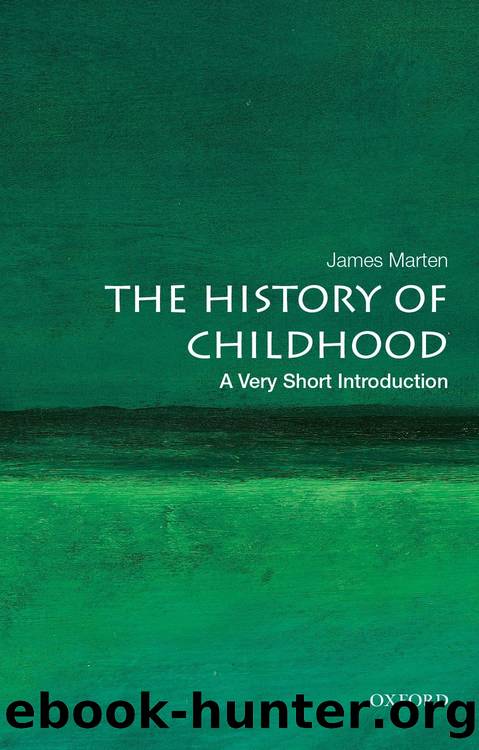The History of Childhood: A Very Short Introduction by James Marten

Author:James Marten [Marten, James]
Language: eng
Format: epub
Tags: Children's Studies, Family & Relationships, History, Social Science
ISBN: 9780190681401
Google: qcp-DwAAQBAJ
Amazon: B07LBXZLG3
Publisher: Oxford University Press
Published: 2018-08-02T03:00:00+00:00
The development of the ideal modern childhood had ramifications not only for indigenous children subject to Western powers but also for children whose parents took up the myriad government, military, and business positions available in the far-flung empires of the European powers. White parents withdrew their children from contact with most native people (except for servants) and re-created the customs and assumptions of bourgeois culture. In addition, at least among the middle-class families who flowed out to the colonies, the old habits of interracial sexual contact declined dramatically.
Although colonial parents expended a great deal of time and energy on creating safe havens for settler children, colonial life remained dangerous, both physically and culturally. Tropical diseases and parasites threatened their health; in Bengal, for instance, the child mortality rate among British children under the age of five in the 1860s of 148 per thousand children was more than double the rate in England. Infants suffered terribly during the summer with various heat-related illnesses; as a result, mothers and children would retreat to the somewhat cooler and drier hill stations during the hot months, leading to long separations from bureaucrat and businessman fathers.
Despite their best efforts, parents could not completely isolate their families, and they displayed chronic ambivalence about the close ties that developed between children and native servants. Doctors advised British mothers in India not to nurse their own children, as it was believed that breast-feeding would further weaken them in a difficult climate. Most hired low-caste women as wet-nurses. Indian women were also hired as nurses for white children and male âbearersâ for boys, which meant that even in middle-class bureaucratsâ families, children spent much of their time with Indian servants. British settlers depended on those servants and relished the status they enjoyed by employing them. Yet child advice writers warned that if servants and children were allowed to become close, the latter would inevitably pick up indigenous manners. Mothers triedâand often failedâto prevent their children from learning to speak local languages.
Schooling provided perhaps the primary method of separating white children from native culture. In the early days of empire building, the Anglo children of soldiers were educated in regimental schools, where boys were trained to become soldiers and clerks and girls were educated to the extent necessary to be soldiersâ wives. Later, the children of colonial administrators were often educated by tutors or in informal schools, although British families often sent their sons to be educated in England, ensuring that they would be trained to take their parentsâ places in the colonial system. Many girls also traveled back to England. Boys might leave by the time they were five, and girls were sent home around the age of eight.
Even as they tried to achieve an idealized childhood for their own children, colonial administrators and expatriates denigrated native child-rearing traditions, employing the language of civilization versus savagery. But as control of colonies such as British India seemed more precarious at the dawn of the twentieth century, officials showed even less interest in extending the benefits of civilization to colonized children.
Download
This site does not store any files on its server. We only index and link to content provided by other sites. Please contact the content providers to delete copyright contents if any and email us, we'll remove relevant links or contents immediately.
| Africa | Americas |
| Arctic & Antarctica | Asia |
| Australia & Oceania | Europe |
| Middle East | Russia |
| United States | World |
| Ancient Civilizations | Military |
| Historical Study & Educational Resources |
Machine Learning at Scale with H2O by Gregory Keys | David Whiting(4292)
Never by Ken Follett(3937)
Fairy Tale by Stephen King(3370)
Oathbringer (The Stormlight Archive, Book 3) by Brandon Sanderson(3151)
The Man Who Died Twice by Richard Osman(3072)
Will by Will Smith(2907)
Rationality by Steven Pinker(2352)
Can't Hurt Me: Master Your Mind and Defy the Odds - Clean Edition by David Goggins(2323)
The Dark Hours by Michael Connelly(2300)
Friends, Lovers, and the Big Terrible Thing by Matthew Perry(2219)
The Dawn of Everything: A New History of Humanity by David Graeber & David Wengrow(2191)
Principles for Dealing With the Changing World Order: Why Nations Succeed and Fail by Ray Dalio(2036)
A Short History of War by Jeremy Black(1842)
HBR's 10 Must Reads 2022 by Harvard Business Review(1839)
Go Tell the Bees That I Am Gone by Diana Gabaldon(1748)
A Game of Thrones (The Illustrated Edition) by George R. R. Martin(1719)
Kingdom of Ash by Maas Sarah J(1667)
515945210 by Unknown(1660)
443319537 by Unknown(1545)
